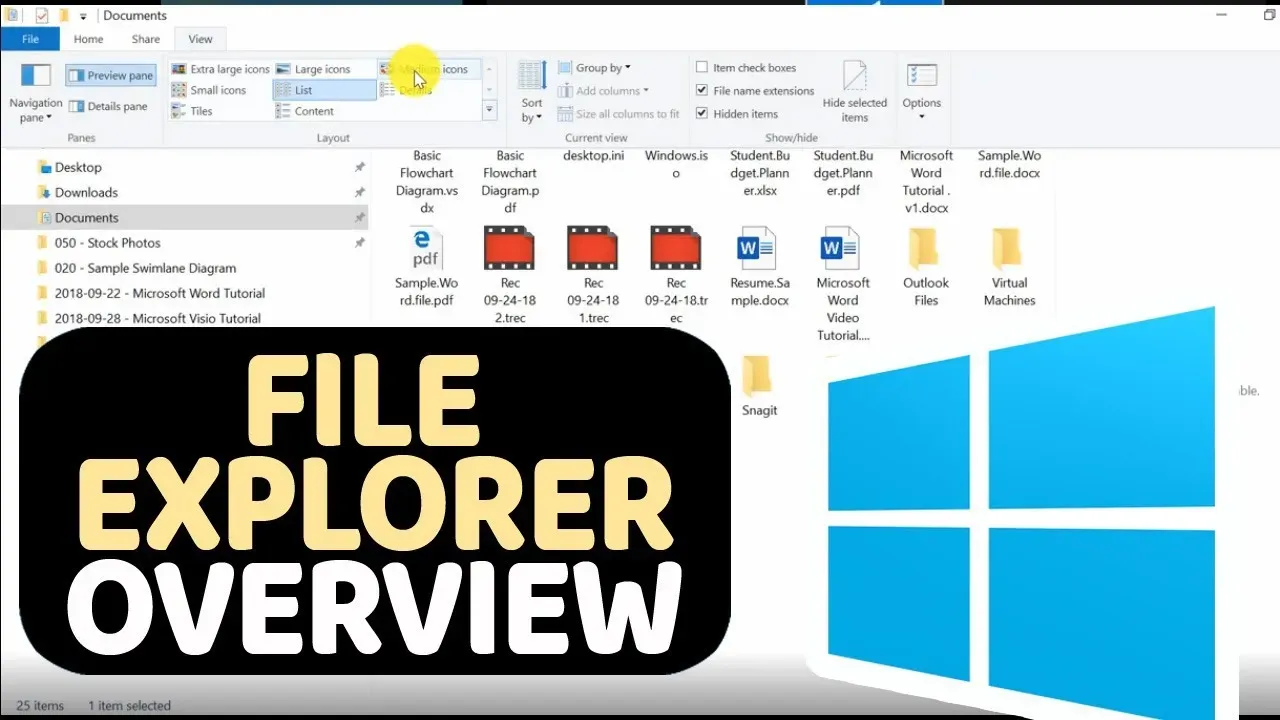Microsoft File Explorer, a critical component of the Windows operating system, has undergone significant changes in response to the recent Windows 11 update, aimed at enhancing user experience while adhering to EU privacy regulations. This overhaul reflects a shift towards a more streamlined and efficient interface, focusing on essential functionalities without the clutter that often hampers productivity. With the elimination of features that tracked user behavior, Microsoft services have embraced a new philosophy: ‘less is more.’ As a result, the File Explorer changes are not merely cosmetic; they signify a broader commitment to user privacy and data security. In this evolving digital landscape, understanding these updates is crucial for both casual users and tech enthusiasts alike.
The latest revisions to Microsoft’s file management system, commonly known as Windows File Explorer, highlight an essential transformation in how users interact with their digital files. This update represents a significant departure from previous versions that emphasized extensive features, now prioritizing a more minimalist approach that aligns with contemporary privacy standards. Users can expect a more direct and less convoluted experience, enhancing their ability to manage files effectively. With the backdrop of EU regulations influencing these adjustments, the changes reflect a growing trend towards prioritizing user autonomy and streamlined functionality in digital environments. This evolution not only improves the utility of the file management system but also marks a pivotal moment in Microsoft’s commitment to safeguarding user data.
Understanding the Recent Changes in Microsoft File Explorer
Microsoft’s recent updates to Windows 11 File Explorer, mandated by EU privacy regulations, have introduced significant changes that affect how users interact with the platform. The overhaul aims to simplify the user experience while ensuring compliance with the stringent privacy standards set by the European Union. With the removal of account-based content, features such as Recent files, Favorites, and Recommended content have been streamlined, allowing for a more straightforward navigation experience. This shift aligns with a growing demand for transparency and user control over personal data, showcasing Microsoft’s commitment to adapting its services to meet regulatory requirements.
These changes highlight a pivotal moment for Microsoft, as it balances user expectations with compliance obligations. The decision to eliminate certain features has sparked conversations within the user community, with many welcoming the move towards a more minimalist interface. The focus on essential functionalities—removing clutter and enhancing usability—reflects a broader trend in software development where simplicity is increasingly favored over complexity. By prioritizing user needs and privacy, Microsoft is not only complying with EU regulations but also positioning itself as a leader in the evolving landscape of digital privacy.
The Impact of EU Privacy Regulations on Microsoft Services
The European Union’s stringent privacy regulations have far-reaching implications for tech giants like Microsoft. As the company navigates these regulatory waters, it is compelled to reassess its offerings, particularly in services that handle user data. The recent changes to File Explorer are a direct response to these regulations, emphasizing the importance of user privacy and data protection. By curbing features that could potentially expose sensitive information, Microsoft is taking proactive steps to align with the legal framework established by the EU, which could serve as a model for global privacy standards in the future.
In light of these regulations, Microsoft faces the challenge of innovating its services while ensuring compliance. This dual focus on advancement and regulation compliance is crucial for maintaining user trust and fostering a secure digital environment. As File Explorer adapts to these new standards, it is likely that other Microsoft services will undergo similar transformations, leading to a comprehensive overhaul of how data is handled within the Windows ecosystem. This evolution underscores the necessity for tech companies to remain agile and responsive to regulatory changes, ultimately shaping a new era of digital interaction.
The Evolution of File Explorer: A Historical Perspective
File Explorer, originally launched as Windows Explorer nearly 30 years ago, has undergone a remarkable transformation reflective of changing user needs and technological advancements. Over the years, its functionality has expanded, adapting to the increasing complexity of file management and data handling. As users began to rely more heavily on digital storage, Microsoft introduced features aimed at enhancing productivity, such as Quick Access and cloud integrations. However, these enhancements often led to a cluttered interface, prompting the recent move towards simplification and user-centric design.
This historical evolution highlights the delicate balance between adding features and maintaining usability. Each iteration of File Explorer has strived to meet user demands while navigating the challenges of an ever-changing digital landscape. The recent overhaul, prompted by privacy concerns and a push towards minimalism, marks a significant chapter in its history. As Microsoft focuses on delivering a cleaner, more efficient user experience, it is essential to acknowledge the legacy of File Explorer and its role as a cornerstone utility for Windows users.
Navigating the Future of Windows 11: What Lies Ahead?
As we look towards the future of Windows 11, the changes being implemented in File Explorer serve as a precursor to broader developments within the operating system. With Microsoft’s commitment to streamlining user experiences and ensuring compliance with privacy regulations, we can expect further innovations that prioritize functionality and ease of use. The introduction of enhanced search capabilities and the potential integration of AI-driven features will likely redefine how users interact with their files, making workflows more intuitive and efficient.
Moreover, the ongoing evolution of Windows 11 reflects a significant shift in the tech industry’s approach to user privacy and productivity. As Microsoft continues to refine its services in response to regulatory pressures and user feedback, we may see a more cohesive ecosystem that aligns with modern expectations. The emphasis on reducing unnecessary bloat and enhancing core functionalities will not only benefit user engagement but also reaffirm Microsoft’s position as a leader in the tech space, committed to innovation while respecting user privacy.
File Explorer Changes: Simplification or Compromise?
The recent changes to Microsoft File Explorer have sparked a debate about whether simplification equates to compromise. On one hand, the removal of certain features in response to EU privacy regulations can be seen as a necessary step towards enhancing user privacy and security. By eliminating account-based content and unnecessary clutter, Microsoft is prioritizing a cleaner interface that focuses on essential functionalities. This approach aligns with the growing demand for transparency and user control in digital interactions.
On the other hand, some users may feel that the reduction of features compromises the overall utility of File Explorer. While simplicity can enhance usability, it may also limit the capabilities that power users rely on for efficient file management. Striking the right balance between simplicity and functionality will be crucial for Microsoft as it navigates these changes. Ultimately, the success of these modifications will depend on user reception and the ability of Microsoft to adapt its services to meet the evolving needs of its customer base.
Privacy and Productivity: A Balancing Act for Microsoft
Microsoft’s commitment to privacy and productivity is at the forefront of its recent updates to Windows 11 File Explorer. The changes reflect a broader trend within the tech industry, where companies are increasingly held accountable for user data protection. By aligning its services with EU privacy regulations, Microsoft is not only safeguarding user information but also enhancing productivity through a more streamlined interface. This dual focus on privacy and efficiency is essential in an era where users expect both security and functionality from their digital tools.
However, this balancing act presents challenges for Microsoft as it seeks to innovate while adhering to regulatory standards. The landscape of digital privacy is constantly evolving, and Microsoft must remain agile in its approach to user data management. By prioritizing user-centric design and transparent practices, the company can work towards creating a safer and more productive environment for its users. As the tech giant continues to refine its services, the interplay between privacy and productivity will remain a critical consideration for its future direction.
The Role of User Feedback in Shaping Microsoft’s Future Updates
User feedback plays a vital role in shaping the future of Microsoft’s updates, particularly in light of the recent changes to File Explorer. As the company navigates the complexities of compliance with EU privacy regulations, it is essential for Microsoft to listen to its user community. Feedback from users provides valuable insights into their experiences and expectations, allowing Microsoft to make informed decisions about feature enhancements and interface modifications. Engaging with the user community fosters a sense of collaboration and ensures that the updates align with their needs.
Moreover, the importance of user feedback extends beyond mere compliance; it is a key driver of innovation. As Microsoft seeks to simplify its services while enhancing functionality, understanding user preferences will be crucial. By actively soliciting and responding to feedback, Microsoft can create a more user-friendly experience that resonates with its audience. This collaborative approach not only strengthens user loyalty but also positions Microsoft as a responsive and responsible leader in the tech industry.
Exploring the Future of File Management in Windows 11
The future of file management in Windows 11 is poised for significant transformation, with Microsoft leading the charge towards a more intuitive and efficient system. The recent overhaul of File Explorer lays the groundwork for a reimagined approach to how users interact with their files. As the company focuses on minimizing clutter and enhancing usability, we can expect to see innovative features that streamline workflows and improve overall productivity. This evolution reflects a commitment to making file management not only simpler but also more effective for users.
Additionally, as Microsoft continues to refine its services, the integration of advanced technologies such as artificial intelligence may play a crucial role in shaping the future of file management. AI-driven features could enhance search capabilities, automate routine tasks, and provide personalized recommendations, transforming the way users engage with their files. By prioritizing user experience and embracing technological advancements, Microsoft is setting the stage for a new era of file management that prioritizes efficiency, security, and user satisfaction.
Frequently Asked Questions
What are the recent changes in Microsoft File Explorer following the Windows 11 update?
The recent Windows 11 update has led to significant changes in Microsoft File Explorer, particularly in response to EU privacy regulations. The update has simplified the interface by removing account-based features like Recent, Favorites, and Recommended content for users within the European Economic Area (EEA). This streamlining aligns with Microsoft’s goal to enhance user privacy while maintaining efficiency in file management.
How does the EU privacy regulation impact Microsoft File Explorer functionalities?
EU privacy regulations have prompted Microsoft to modify functionalities in File Explorer, particularly in Windows 11. Features associated with Entra ID, such as account-based content suggestions, have been disabled to comply with data protection standards. This aims to prevent the potential misuse of sensitive information while ensuring a cleaner, more focused user experience.
What does the term ‘Elvis-ification’ refer to in the context of Microsoft File Explorer?
In the context of Microsoft File Explorer, ‘Elvis-ification’ describes the process where useful features become bloated with unnecessary elements, detracting from their original purpose. The recent updates aim to combat this by streamlining File Explorer, making it simpler and more efficient for users to manage their files without distractions.
Are there any anticipated features for Microsoft File Explorer in the upcoming Windows 11 updates?
Yes, upcoming Windows 11 updates are expected to enhance Microsoft File Explorer with improved search functionalities, particularly for Copilot+ PCs. These enhancements are designed to further streamline the user experience, making it easier for users to locate and manage files efficiently.
What is the significance of streamlining Microsoft File Explorer in Windows 11?
Streamlining Microsoft File Explorer in Windows 11 is significant as it aligns with both user needs and regulatory requirements. By reducing clutter and focusing on essential features, Microsoft aims to enhance productivity and user satisfaction while complying with EU privacy regulations, ensuring a safer file management experience.
How can users adapt to the changes in Microsoft File Explorer after the Windows 11 update?
Users can adapt to the changes in Microsoft File Explorer by familiarizing themselves with the new simplified interface and exploring the remaining features that enhance file management. Engaging with the updated functionalities and utilizing the streamlined options will help users maintain productivity despite the alterations.
What are the privacy implications of using Microsoft File Explorer after the overhaul?
After the overhaul, Microsoft File Explorer’s privacy implications are more favorable for users within the EU. The removal of account-based content reduces the risk of sensitive data exposure, aligning with strict EU privacy regulations. Users can expect a safer file management experience with minimized tracking and data collection.
| Key Points | Details |
|---|---|
| Microsoft’s File Explorer Overhaul | Streamlined to comply with EU privacy regulations, eliminating account-based content. |
| Historical Context | File Explorer has evolved over nearly 30 years, facilitating data management for users. |
| User Reaction | Despite concerns, the simplification has been welcomed by the user community. |
| Privacy Concerns | EU regulators scrutinized Microsoft for potential privacy risks linked to Entra ID. |
| Future Prospects | Enhanced Windows Search and potential shifts towards a more user-friendly interface are anticipated. |
Summary
Microsoft File Explorer has undergone significant changes to meet EU privacy standards, which has led to a more streamlined and user-friendly interface. This overhaul simplifies the way users interact with their files and reflects Microsoft’s commitment to enhancing productivity while adhering to privacy regulations. The positive reception from users suggests a promising shift towards a more efficient file management experience, paving the way for future improvements in Windows 11.










